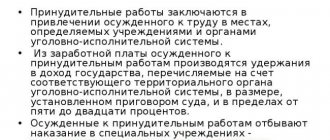Minimum and maximum periods of stay in a pre-trial detention center
The period of detention in a pre-trial detention center must be counted towards the total period of imprisonment. At the legislative level, minimum and maximum values for detention in a pre-trial detention center are determined.
In fact, there is no minimum period for keeping a suspect in a pre-trial detention center at the legislative level. This is due to the fact that the duration of the period is determined by the employee of the investigative agency based on the available data (evidence of guilt, as well as the level of social danger of the criminal).
Attention! If the investigator believes that the suspect has no reason to hide from the investigation, he has every right to release the person on his own recognizance.
The maximum length of stay of a suspect in a pre-trial detention center is considered variable. It directly depends on the social danger of the person in custody, as well as the severity of the crime charged with him. When determining the period of stay in a pre-trial detention center, several nuances must be taken into account.
These include:
- on the basis of Article 109 of the Criminal Procedure Code of the Russian Federation, the standard period of stay in a pre-trial detention center should not exceed two months,
- paragraph two of Article 109 of the Criminal Procedure Code of the Russian Federation allows for an increase in the two-month period of stay in a pre-trial detention center to six months on the basis of reliable facts available to the investigation indicating the guilt of the suspect,
- Paragraph three of Article 109 of the Code of Criminal Procedure of the Russian Federation allows the period of stay in a pre-trial detention center to be extended to one and a half years due to the social danger of the suspect, the severity of the crime charged to him, as well as difficulties in collecting evidence of a person’s guilt.
How to send a letter to a pre-trial detention center?
Prohibition on longer stays in pre-trial detention centers
At the legislative level, it is prohibited to increase the length of stay of a suspect in a pre-trial detention center. But, as practice shows, if further detention is necessary, the investigator can use a little trick.
For example, after a year and a half, an agency employee will invite the prisoner to familiarize himself with the case materials. And such a procedure can take several months.
Sometimes the period of detention of a suspect in a pre-trial detention center is extended for two or more years. In fact, the rights of the suspect have been violated, but no one pays attention to this. In Russia, it is customary that if a person is judged, it means that he cannot enjoy any rights.
But the prisoner has every right to file a complaint against the actions of the investigative authorities and the executive authority in court.
If the investigator did not have time to transfer the case materials to the suspect for review during the prescribed period of detention in the pre-trial detention center, the person must be released from custody. But in practice this is not done. The offender continues to be in custody even if the maximum period of stay in the pre-trial detention center has expired.
Termination of an employment contract and recording of working hours
At the same time, the detention of an employee is not grounds for his dismissal for absenteeism . Absenteeism, for which, according to clause 6 “a” of Art. 81 of the Labor Code of the Russian Federation, an employment contract can be terminated by the employer, defined as absence from the workplace without good reason during the entire working day (shift), regardless of its duration, as well as in case of absence from the workplace without good reason for more than four hours in a row during a working day (shift).
Taking an employee into custody is not grounds for his dismissal for absenteeism.
The absence of an employee from the workplace against his will, as in the case of detention for committing an unlawful act, does not apply to disciplinary actions for which the employer has the right to apply disciplinary sanctions within the framework of labor legislation. Such absence from work is not absenteeism, since it was caused by valid reasons, since the employee was arrested and was in custody (Resolution of the Presidium of the Moscow Regional Court dated October 13, 2004 No. 631 in case No. 44g-562/04). However, in accordance with clause 4, part 1, art. 83 of the Labor Code of the Russian Federation, an employment contract is subject to termination due to circumstances beyond the control of the parties, if the employee is sentenced to a punishment that precludes the continuation of his previous work, in accordance with a court verdict that has entered into legal force.
According to Part 4 of Art. 91 of the Labor Code of the Russian Federation, the employer is obliged to keep records of the time actually worked by each employee. Current regulations do not contain direct instructions on how to record in the Time Sheet the absence of an employee from the workplace if he is in a pre-trial detention center. Since detention is a valid reason for absence from work, absenteeism should not be noted on the Report Card. It is permissible to use the letter code NB “Suspension from work (preclusion from work) for reasons provided for by law, without calculating wages,” which corresponds to digital code 35. And if information about the employee’s detention was received by the organization late, then you can indicate the letter NN code “Failure to appear for unknown reasons (until the circumstances are clarified).”
In what proportion can time spent in isolation be counted, and under what circumstances?
In some cases, the period of stay in a pre-trial detention center is counted towards the total prison term.
Important! In fact, the sentence is commuted in the following proportions:
- when assigning compulsory labor or applying a disciplinary sanction for a military serviceman, the period of stay in a pre-trial detention center is counted one to one,
- when imposing a sentence of restriction of freedom, the period of stay in a pre-trial detention center is counted in a ratio of 2 to 1,
- if the convicted person was sentenced to correctional labor or suspended from military service, then the period of stay in the pre-trial detention center is counted in the proportion of 3 to 1,
- If the court imposed a sentence in the form of compulsory work, the period of stay in the pre-trial detention center is counted in the proportion of 1 day for 8 hours of work.
Thus, we can conclude that the period of stay in a pre-trial detention center should in any case be counted towards the total period of imprisonment and mitigate the punishment.
Rules for transfer to a pre-trial detention center.
What to do if a person arrives at a pre-trial detention center and is given a fine
If, after a long stay in a pre-trial detention center, a suspect is sentenced to a fine, the convicted person can count on some relief. The court does not have the right to completely cancel the fine on account of serving the sentence in a pre-trial detention center.
But it is quite possible to reduce its size. It should be noted that a similar rule also applies to other types of punishment, such as suspension of activities or holding a position.
Example
The man was charged with abusing his official powers for his own personal gain. The investigation lasted three months. All this time the suspect was in the pre-trial detention center.
On the appointed day, the court considered the case, the evidence on it and imposed a punishment in the form of release of the convicted person from office for two years. In this case, the court has the right to mitigate this punishment. Instead of two years, the convicted person will not be able to hold office for only one and a half years.
Attention! Our qualified lawyers will assist you free of charge and around the clock on any issues. Find out more here.
Calculation of insurance period
According to clause 5, part 1, art. 12 Federal Law of December 28, 2013 No. 400-FZ “On insurance pensions” for citizens who were unjustifiably prosecuted, unjustifiably repressed and subsequently rehabilitated, the time of detention, stay in places of imprisonment and exile is counted in the insurance period along with periods of work.
In para. 5 clause 3.1 of the Resolution No. 29-P of November 19, 2015, Constitutional Court of the Russian Federation, part 1 of Art. 11 of the Federal Law “On Insurance Pensions”), and along with them, other (non-insurance) periods are counted in the insurance period, including the period of detention of persons who were unjustifiably prosecuted and subsequently rehabilitated, and the period of serving their sentences in places of deprivation freedom and exile (clause 5, clause 1, article 11 of the Federal Law “On Labor Pensions in the Russian Federation”, clause 5, part 1, article 12 of the Federal Law “On Insurance Pensions”)...” At the same time, the periods provided for in Part 1 of Art. 12 Federal Law “On Insurance Pensions” in accordance with Part 2 of Art. 12 of this law are counted towards the insurance period if they were preceded and (or) followed by periods of work and (or) other activities (regardless of their duration) specified in Art. 11 of the same law (Appeal ruling of the Moscow City Court dated 06/02/2020 in case No. 33-13751/2020).
Thus, the insurance period is equal to the periods of work and (or) other activities that are provided for in Art. 11 of the Federal Law “On Insurance Pensions”, the period of detention and the period of serving a sentence in places of imprisonment and exile are counted if these persons were unjustifiably prosecuted, unjustifiably repressed and subsequently rehabilitated.
House arrest credit
Previously, one day of house arrest counted as one day of imprisonment. That is, if a person spent 2 months in a pre-trial detention center, and the court ordered him 6 months of house arrest, then he will only have to spend 4 months under restriction of freedom.
With the introduction of the new law, two days of house arrest began to be counted as 1 day of detention. For example, if before the trial the defendant was in a pre-trial detention center for 2 months, and the court ordered six months of house arrest, then the convicted person remains to serve 8 months of the sentence.
Watch the video. The length of time spent in pre-trial detention centers has been recalculated for Russian convicts:
Let's sum it up
The employer has the right not to pay for the days the employee is in custody when the employee does not fulfill his job duties. During this period, insurance contributions to extra-budgetary funds are also not charged.
At the same time, detention and detention are not recognized by labor legislation as grounds for termination of an employment contract. Therefore, until the court makes a verdict precluding the employee from continuing his previous work, such an employee cannot be dismissed. The validity of the employee’s absence and the legality of his return to work can be confirmed by such documents as a court decision on detention and an acquittal.
Review of sentences
In connection with the introduction of a new bill establishing the procedure for counting the period of stay in a pre-trial detention center against the total period of imprisonment, a legitimate question arises whether prisoners who have been serving their sentences in places of deprivation of liberty for a long time can count on relief.
The answer is simple. Any changes towards mitigation of punishment are welcomed by the law. That is, if previously the prisoner did not expect a reduction in the total term of imprisonment for the period of his stay in the pre-trial detention center, now he has received this right. This rule is justified by Article 10 of the Criminal Code of the Russian Federation.
Remember! But if a preventive measure in the form of house arrest was chosen as punishment, the prisoner cannot count on relief. However, this only applies to those prisoners whose sentence was passed before July 14, 2018.
Based on Article 10 of the Criminal Code of the Russian Federation, any change in relation to the prisoner in the direction of deterioration is not allowed under any circumstances. For example, if, in connection with the adoption of a bill, the total term of imprisonment is increased, then this provision does not apply to the convicted person.
Wages, insurance premiums and benefits
A preventive measure was chosen against an employee performing work on the basis of an employment contract - detention. The inquirer, investigator or judge makes a decision on the selection of a preventive measure, and the court makes a ruling. A copy of the said decision or ruling is handed over to the person in respect of whom it was issued, as well as his defense attorney or legal representative at their request (Articles 5, 98, 101 of the Criminal Procedure Code of the Russian Federation).
Since during the period of detention the employee does not fulfill his official duties, there is no basis for calculating wages, which constitute remuneration for work (Article 129 of the Labor Code of the Russian Federation). There is also no basis for paying average earnings for this period, since this is not provided for by labor legislation. Accordingly, there is no basis for charging insurance premiums to extra-budgetary funds.
According to paragraphs. 3 p. 1 art. 9 Federal Law of December 29, 2006 No. 255-FZ “On compulsory social insurance in case of temporary disability and in connection with maternity”, temporary disability benefits are not assigned to the insured person for the period of detention or administrative arrest. When calculating temporary disability benefits, from the number of calendar days for which it is paid, calendar days falling during the period of detention or administrative arrest are excluded (clause “c”, paragraph 17 of the Regulations approved by Decree of the Government of the Russian Federation of June 15, 2007 No. 375 ).
But if the time an employee is in custody coincides with his non-working periods in which the average earnings are maintained, for example, with the employee’s annual paid leave, then the average earnings are maintained.
Procedural procedure
At the legislative level, there are deadlines within which the heads of correctional colonies are obliged to recalculate the total period of imprisonment of people serving their sentences in connection with the adoption of a new bill. Based on current legislation, the recalculation must be made within three months by the heads of settlement colonies and within six months by the heads of general regime colonies.
Based on the new bill, the heads of correctional colonies are required to conduct an audit and identify persons who fall under the so-called “amnesty”. Next, they are obliged to send the presentation to the court, and the judicial body will decide whether to reduce the total period of imprisonment for the convicted person.
As practice shows, the court actively counts the time spent in a pre-trial detention center in the total period of imprisonment. If the head of the colony has not sent the presentation to the court, then the convicted person has every right to present this paper independently.
However, this is his right, not his obligation. The convicted person can take advantage of this legislative act or refuse relief.
Based on the study, statistics workers revealed that more than one hundred thousand prisoners across the country are covered by the new bill.
Conditions of detention in a colony-settlement.
How to write a petition
petitions for recalculation of the term of imprisonment free of charge in word format
Based on Articles 396, 397 of the Criminal Procedure Code of the Russian Federation and 72 of the Criminal Code of the Russian Federation, the decision to count the period of stay in a pre-trial detention center against the total period of imprisonment is made by the same court that imposed the punishment. That is, the application must be submitted here.
If the convicted person is already serving a sentence in a remote region from the place of destination of the sentence, the petition is submitted at the place of stay. The application will be considered by the court located in the region where the sentence is served.
In connection with the adoption of the new law, a lot of questions arise. It is not always clear to convicts where and how to file a petition, because the Supreme Court has not given detailed explanations.
To clarify the situation, we need to consider several real examples.
Example 1
Citizen Ivanov was sentenced to five years in prison in 2013. In 2021, he fully served his sentence and was released. In 2021, Ivanov decided to write a petition to count the period of stay in the pre-trial detention center against the general period.
A legitimate question arises: why write such a statement, since the punishment has already been served. The answer is simple. Due to the inclusion of the period of stay in a pre-trial detention center in the total period of imprisonment, the duration of the criminal record is also reduced.
Example 2
Citizen Ivanov was sentenced to imprisonment in a general regime correctional colony. But while serving the sentence, it was decided to accept relief. Ivanov was transferred to a penal colony. In 2021, Ivanov filed a petition to recalculate the total term of imprisonment.
In this case, the recalculation will be made as follows: 1 day of stay in a pre-trial detention center - 1.5 days of serving in a penal colony, and 1 day of stay in a pre-trial detention center - 2 days of serving a sentence in a general regime colony.
Thus, a petition to include the period of stay in a pre-trial detention center in the general period of punishment is submitted by the head of the colony where the prisoner is staying. If the head of the colony does not want to submit an application on his own, the prisoner himself can do this.
The application must be submitted exclusively in writing. The court has the right to make a decision without the presence of the prisoner. The decision is sent within 10 days from the date of its adoption.
Meaning of the word count
Examples of the use of the word count in literature.
For example, under a special agreement, special agricultural activities could be counted toward the rent.
In this case, the time spent serving the restriction of freedom is counted towards the term of imprisonment at the rate of one day of imprisonment for one day of restriction of freedom.
The time a person is held in custody before trial is counted towards the terms of imprisonment, detention in a disciplinary military unit and arrest at the rate of one day for one day, restrictions on freedom - one day for two days, correctional labor and restrictions on military service - one day for three days, and during the period of compulsory work - at the rate of one day of detention for eight hours of compulsory work.
The time of holding a person in custody before the court verdict enters into legal force and the time of serving imprisonment imposed by a court verdict for a crime committed outside the Russian Federation, in the case of extradition of a person on the basis of Article 13 of this Code, are counted at the rate of one day for one day.
In the event that goods are shipped by the supplier to several recipients specified in the supply agreement or the buyer's shipping order, goods delivered to one recipient in excess of the quantity provided for in the contract or shipping order are not counted toward covering shortfalls to other recipients, unless otherwise provided in the contract.
In cases where the supply of goods of the same name is carried out by the supplier to the buyer simultaneously under several supply contracts and the quantity of goods supplied is not enough to pay off the supplier’s obligations under all contracts, the delivered goods must be counted towards the fulfillment of the contract specified by the supplier when making the delivery or without delay after delivery.
If the buyer has paid the supplier for goods of the same name received under several supply contracts, and the payment amount is not enough to repay the buyer’s obligations under all contracts, the amount paid must be counted towards the fulfillment of the contract specified by the buyer when paying for the goods or without delay after payment.
When recalculating for services not provided, the amount of the payment reduction is counted toward future payments.
IBAs from Mary and Chirchik were involved in combat work almost every year, flying as replacements or based at border airfields, flights from which were counted as flight-tactical exercises.
The supply of goods of one name in a larger quantity than provided for in the supply contract does not count toward the shortfall of goods of another name included in the same assortment, and is subject to replenishment, except in cases where such delivery is made with the prior written consent of the buyer.
Tempograd clocks count as space clocks, tenfold.
The loan was issued to the landowner in interest-bearing papers and was counted against the peasants as a government debt.
Amounts of money received from the borrower to fulfill an obligation under a loan agreement are included in the bank’s income only if, in accordance with Article 319 of the Civil Code of the Russian Federation and the terms of the loan agreement, they are counted towards the repayment of interest for the use of borrowed funds. The commercial bank applied to arbitration court with a claim to invalidate the tax inspectorate's decision to recover understated profits and apply financial sanctions.
The hero's correct judgment about his own situation is counted toward his justification, and a false one is imputed to him as guilt.
The time spent serving correctional labor was counted in the total length of service, however, it was not included in the length of service giving the right to receive benefits and salary bonuses.
Source: Maxim Moshkov library
Who does the recalculation not apply to?
Please note that persons convicted of a crime again, as well as persons convicted for the first time of committing a serious crime, are ordered by the court to serve their sentence in a maximum security colony. In this case, the period of stay in the pre-trial detention center is counted in a ratio of one to one.
Based on Article 72 of the Criminal Code of the Russian Federation, there are crimes for which the period of stay in a pre-trial detention center is not counted towards the total period of punishment.
These include:
- committing a terrorist act,
- participation or assistance in committing a terrorist act,
- call for participation in terrorist activities,
- hostage taking,
- car theft for terrorist activities,
- storage and sale of narcotic substances on a large scale.
Watch the video. Amendments to Article 72 of the Criminal Code of the Russian Federation:










